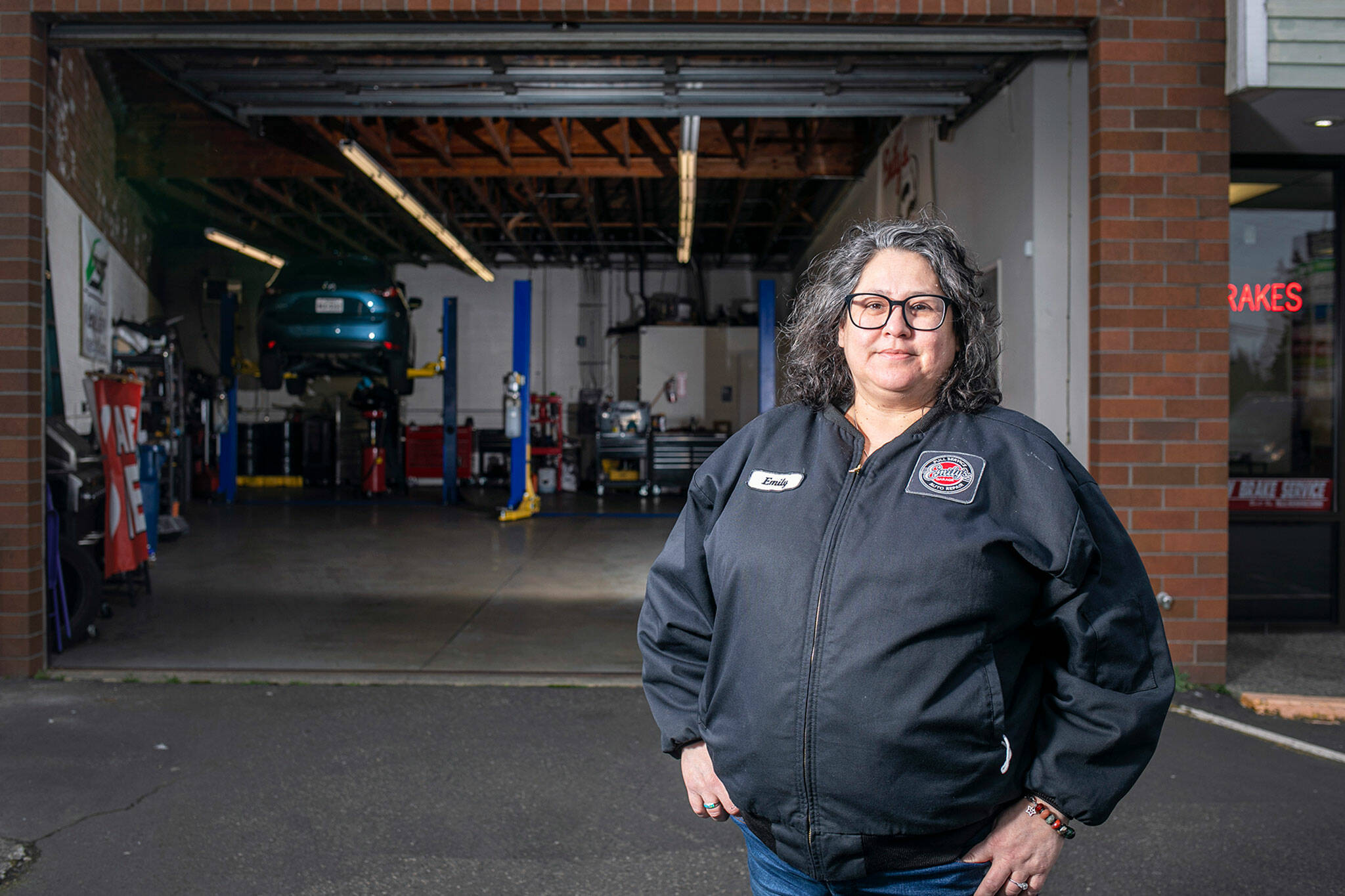EVERETT — Search the web for “auto repair shop near me” and you’re bound to find one named after a man. The Seattle metropolitan area is home to Bernie’s, Gary’s, Glenn’s, Chuck’s and more.
But Emiliana “Emily” Chávez wanted to stand out.
“You see all of these different, male-dominant business names for this space,” said Chávez, 48. “And we thought, let’s come up with a brand that’s different.”
So Emily’s Garage launched in 2017.
What started out as a vehicle inspection service has since grown to be two full-service auto repair shops in Everett and Tacoma. Chávez also has three other locations in the Seattle and Portland areas performing fleet maintenance for car rental and ride share services.
Chávez wants Emily’s Garage to be known for clean shops and transparent staff. Her goal is to educate customers about their cars and never up-sell. She also wants to have a business where women feel comfortable and respected.
“One of the challenges in this space is, as a woman going to get car repairs, even (though) I’m experienced in auto, you still get treated a certain way,” Chávez said. So Emily’s Garage “started out as female-centric.”
Women are in the minority at auto repair shops. As of 2021, women made up only 9.5% of all people employed in the automotive repair and maintenance industry, according to the U.S. Bureau of Labor Statistics.
Only 2.3% of automotive service technicians and mechanics are women. So it’s unusual for a person like Chávez to work in auto repair, let alone run their own shop.
“These old guys that have been in the space a long time, they can’t believe that there’s a female-owned auto business,” she said.
Chávez attributes her success to the skill set she developed over 20 years. Growing up in New Mexico, she watched her father work on cars throughout her childhood. Chávez moved to Seattle more than two decades ago and worked at the Kenworth Truck Co.
There Chávez worked several jobs at the PACCAR-owned call center but mostly dealt with roadside assistance and implementing software. After seven years, she felt it was time to move on.
“PACCAR is a very male-dominated auto industry business,” Chávez said. “As a Latina woman, I reached my ceiling, and I knew that it was time. If I wanted change and to make more money, I’d have to leave.”
She left and spent the next decade performing data analysis for T-Mobile and, later, firms working with Microsoft.
One night over dinner at Columbia City Ale House, Chávez’s husband, Barnabus Gillmon, brought up the idea of starting a vehicle inspection service for ride share companies. He saw a void in the market he thought they could help fill. Chávez was sold.
“I got really savvy at software. My husband is really savvy at cars. So when he pitched the idea of starting this business, I was down.”
So the two co-founded the shop in 2017. The couple used their personal savings to cover start-up costs. Chávez said inspections don’t require too much equipment, mostly computers and floor jacks, so they were able to start out small and scale up as business grew.
“We’ve done this with zero investment, just on blood, sweat and tears,” she said.
Chávez landed a contract with Lyft and business boomed. Emily’s Garage performed about 30,000 inspections for the rides share company in the first year. After six months, Chávez was able to use revenue to expand.
Emily’s Garage opened its Everett location in January 2018. The shop at 315 E. Casino Road was another place to perform vehicle inspections but also did direct-to-consumer repairs. Today the shop services about 15 cars a day.
“Part of the reason we opened this location is because we didn’t want to only have vehicle inspections tied to Lyft, should anything happen. Which was very fortuitous, because COVID happened.”
The ride share market plummeted in 2020, and Lyft pulled out of its contact.
“It was hard,” she said.
Fortunately, Emily’s Garage was classified as an essential business and was exempt from the state’s stay-at-home work order. Then came Hertz. Chávez landed a contract inspecting and reconditioning cars for the company. Rentals were down, so Hertz tried to offload its fleet on the used market.
“And then it really blew up because we were doing such a good job.”
The consumer-direct business also boomed as a chip shortage affected car manufacturers. People hung on to their old cars and spent money fixing them up.
“It’s an interesting time,” Chavez said. “So when you have a repair facility that can fix these cars, you’re going to do all right.”
Next month Chávez will celebrate the fifth anniversary of Emily’s Garage’s founding.
“The most rewarding thing is just the teams that we’ve built, and the customer relationships we built, and the problems we have solved for big enterprise companies. As a very small business, that’s super rewarding,” she said.
Moving forward, Chávez wants to perform outreach to schools and hire female mechanics. But for the moment she has her hands full.
“I’d like to get to the point where we’re not drinking out of the fire hose,” she quipped.
Eric Schucht: 425-339-3477; eric.schucht@heraldnet.com; Twitter: @EricSchucht.
Talk to us
> Give us your news tips.
> Send us a letter to the editor.
> More Herald contact information.

























